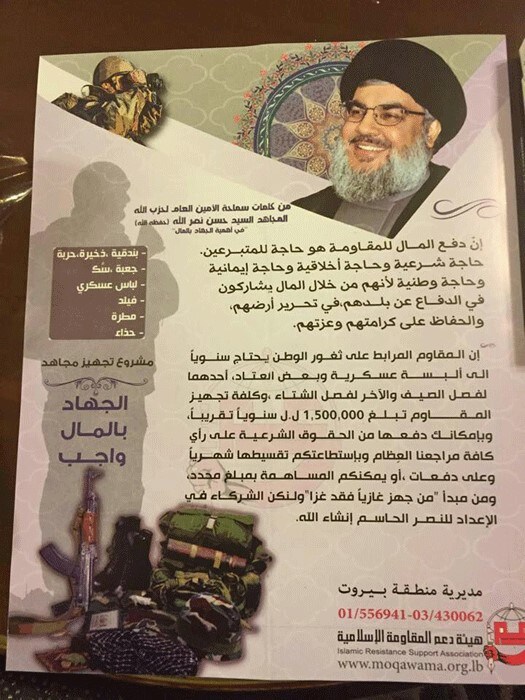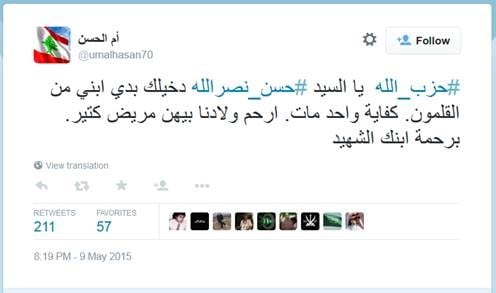by Khaled Abu Toameh
- Since the beginning of this year, the Egyptians have opened the Rafah border crossing for five days only. The international community and media often talk about Israel's responsibility for the ongoing blockade of the Hamas-controlled Gaza Strip, while ignoring that the Egyptians have been imposing severe travel restrictions on the 1.7 million Palestinians living there.
- "We understand Egypt's security concerns in Sinai, but it's time for the Egyptians to reopen the border crossing on a permanent basis, especially in light of the historic relations between Egypt and Palestine." — Salah Abdel Ati, Palestinian human rights activist
- It is shameful for the Egyptians and other Arabs that, while they are imposing various restrictions on Palestinians, Israel is helping patients from the Gaza Strip undergo surgery in Jerusalem. Ironically, the frustration and bitterness eventually translate into violence against Israel, not Egypt. The Palestinians are well aware that attacking Egypt would draw a very strong response from the Egyptian military.
- Instead of pointing the finger of blame at Israel, it is time for
the international media and community to put pressure on Egypt and
other Arab countries to help their Palestinian brethren and to stop
torturing and humiliating them.
Yussra al-Najjar, a 65-year-old woman from the Gaza Strip, died
this week while waiting to return from Egypt to the Gaza Strip. She and
hundreds of Palestinians had been stranded on the Egyptian side of the
Rafah border crossing for the past few months.
Al-Najjar is the tenth Palestinian to die while waiting for the Egyptians to reopen the Rafah terminal. Her relatives said she lost consciousness while waiting inside the travelers' hall on the Egyptian side of the border and was rushed to an Egyptian hospital, where she was pronounced dead.
The story of the Palestinian woman who passed away after being banned from by the Egyptian authorities from returning home to the Gaza Strip is unlikely to make it to the pages of major Western newspapers. Her story would have won extensive media coverage had she been stranded on the Israeli side of the border for even one day.
But in this instance, al-Najjar was the victim of a months-long blockade imposed on the Gaza Strip by an Arab country, Egypt, and not Israel.
The Egyptians claim that they actually saved her life by quickly transferring her to an Egyptian hospital for first aid. They said that afterwards she was moved to a hospital inside the Gaza Strip.
This claim, however, did not stop some Palestinian media outlets from reporting that the "Egyptians killed an elderly Palestinian woman."
Since the beginning of this year, the Egyptians have opened the Rafah border crossing for five days only.
This week, in a surprise move, the Egyptians reopened the Rafah terminal for three days, to allow Palestinians stranded on the Egyptian side of the border to return to their homes inside the Gaza Strip. Still, Palestinians were not permitted to use the terminal to leave the Gaza Strip. These include students who are studying in various universities around the world and laborers working mostly in Arab countries.
The international media and community often talk about Israel's responsibility for the ongoing blockade of the Hamas-controlled Gaza Strip, while ignoring that the Egyptians have been imposing severe travel restrictions on the 1.7 million Palestinians living there.
The tough Egyptian measures include the closure of the Rafah border crossing between the Gaza Strip and Egypt -- a policy that has left thousands of Palestinian travellers stranded on the Egyptian side of the terminal for the past three months.
Meanwhile, thousands of Palestinians have been unable to leave the Gaza Strip for several months due to the continued closure of the Rafah border crossing by the Egyptian authorities.
In addition to the students and laborers, there are more than 3,500 Palestinian patients in the Gaza Strip who have been waiting for many months to cross the terminal to receive medical treatment in Egypt and other Arab countries.
Egypt's continued closure of the Rafah terminal has failed to attract the attention of many Western journalists covering the Israeli-Palestinian conflict. Some of the journalists say they are unable to report about the plight of the Palestinian travellers stranded on the Egyptian side of the border because the Egyptian authorities will not allow them to reach the area. Other journalists find it easier to cover the story from the Israeli side, which allows them to put the onus of the blockade on Israel.
Palestinian human rights activist Salah Abdel Ati said that Egypt's continued closure of the Rafah border crossing was a form of collective punishment against the Palestinians of the Gaza Strip. "The Rafah terminal is the only opening of the Gaza Strip to the outside world," he explained. "Its continued closure is a violation of human rights and causes grave suffering to thousands of people. We understand Egypt's security concerns in Sinai, but it's time for the Egyptians to reopen the border crossing on a permanent basis, especially in light of the historic relations between Egypt and Palestine."
While Egypt's security concerns may be justified, particularly in light of the war that the Egyptian authorities are waging against jihadi terrorists in Sinai, there is no reason why the Egyptians continue to prevent Palestinians from returning to their homes in the Gaza Strip. There is also no reason why the Egyptians are continuing to punish thousands of university students, laborers and patients in need of urgent medical treatment.
It is shameful for the Egyptians and other Arabs that, while they are imposing various forms of restrictions on Palestinians, Israel is helping patients from the Gaza Strip undergo surgery in Jerusalem.
The Egyptians are capable of checking every passenger entering or leaving the Gaza Strip the same way Israel does on its border with the Gaza Strip.
Egypt's keeping the Rafah border crossing shut only aggravates the humanitarian and economic crisis in the Gaza Strip. The irony is that the frustration and bitterness eventually translate into violence against Israel, and not Egypt. The Palestinians are well aware that attacking Egypt would draw a very strong response from the Egyptian army. Instead of pointing the finger of blame at Israel, it is time for the international media and community to put pressure on Egypt and other Arab countries to help their Palestinian brethren and to stop torturing and humiliating them.
Al-Najjar is the tenth Palestinian to die while waiting for the Egyptians to reopen the Rafah terminal. Her relatives said she lost consciousness while waiting inside the travelers' hall on the Egyptian side of the border and was rushed to an Egyptian hospital, where she was pronounced dead.
The story of the Palestinian woman who passed away after being banned from by the Egyptian authorities from returning home to the Gaza Strip is unlikely to make it to the pages of major Western newspapers. Her story would have won extensive media coverage had she been stranded on the Israeli side of the border for even one day.
But in this instance, al-Najjar was the victim of a months-long blockade imposed on the Gaza Strip by an Arab country, Egypt, and not Israel.
The Egyptians claim that they actually saved her life by quickly transferring her to an Egyptian hospital for first aid. They said that afterwards she was moved to a hospital inside the Gaza Strip.
This claim, however, did not stop some Palestinian media outlets from reporting that the "Egyptians killed an elderly Palestinian woman."

The Rafah border crossing between Egypt and Gaza, January 2009. (Source: International Transport Workers' Federation)
|
Since the beginning of this year, the Egyptians have opened the Rafah border crossing for five days only.
This week, in a surprise move, the Egyptians reopened the Rafah terminal for three days, to allow Palestinians stranded on the Egyptian side of the border to return to their homes inside the Gaza Strip. Still, Palestinians were not permitted to use the terminal to leave the Gaza Strip. These include students who are studying in various universities around the world and laborers working mostly in Arab countries.
The international media and community often talk about Israel's responsibility for the ongoing blockade of the Hamas-controlled Gaza Strip, while ignoring that the Egyptians have been imposing severe travel restrictions on the 1.7 million Palestinians living there.
The tough Egyptian measures include the closure of the Rafah border crossing between the Gaza Strip and Egypt -- a policy that has left thousands of Palestinian travellers stranded on the Egyptian side of the terminal for the past three months.
Meanwhile, thousands of Palestinians have been unable to leave the Gaza Strip for several months due to the continued closure of the Rafah border crossing by the Egyptian authorities.
In addition to the students and laborers, there are more than 3,500 Palestinian patients in the Gaza Strip who have been waiting for many months to cross the terminal to receive medical treatment in Egypt and other Arab countries.
Egypt's continued closure of the Rafah terminal has failed to attract the attention of many Western journalists covering the Israeli-Palestinian conflict. Some of the journalists say they are unable to report about the plight of the Palestinian travellers stranded on the Egyptian side of the border because the Egyptian authorities will not allow them to reach the area. Other journalists find it easier to cover the story from the Israeli side, which allows them to put the onus of the blockade on Israel.
Palestinian human rights activist Salah Abdel Ati said that Egypt's continued closure of the Rafah border crossing was a form of collective punishment against the Palestinians of the Gaza Strip. "The Rafah terminal is the only opening of the Gaza Strip to the outside world," he explained. "Its continued closure is a violation of human rights and causes grave suffering to thousands of people. We understand Egypt's security concerns in Sinai, but it's time for the Egyptians to reopen the border crossing on a permanent basis, especially in light of the historic relations between Egypt and Palestine."
While Egypt's security concerns may be justified, particularly in light of the war that the Egyptian authorities are waging against jihadi terrorists in Sinai, there is no reason why the Egyptians continue to prevent Palestinians from returning to their homes in the Gaza Strip. There is also no reason why the Egyptians are continuing to punish thousands of university students, laborers and patients in need of urgent medical treatment.
It is shameful for the Egyptians and other Arabs that, while they are imposing various forms of restrictions on Palestinians, Israel is helping patients from the Gaza Strip undergo surgery in Jerusalem.
The Egyptians are capable of checking every passenger entering or leaving the Gaza Strip the same way Israel does on its border with the Gaza Strip.
Egypt's keeping the Rafah border crossing shut only aggravates the humanitarian and economic crisis in the Gaza Strip. The irony is that the frustration and bitterness eventually translate into violence against Israel, and not Egypt. The Palestinians are well aware that attacking Egypt would draw a very strong response from the Egyptian army. Instead of pointing the finger of blame at Israel, it is time for the international media and community to put pressure on Egypt and other Arab countries to help their Palestinian brethren and to stop torturing and humiliating them.
Khaled Abu Toameh Follow Khaled Abu Toameh on Twitter
Source: http://www.gatestoneinstitute.org/5847/gaza-blockade
Copyright - Original materials copyright (c) by the authors.






